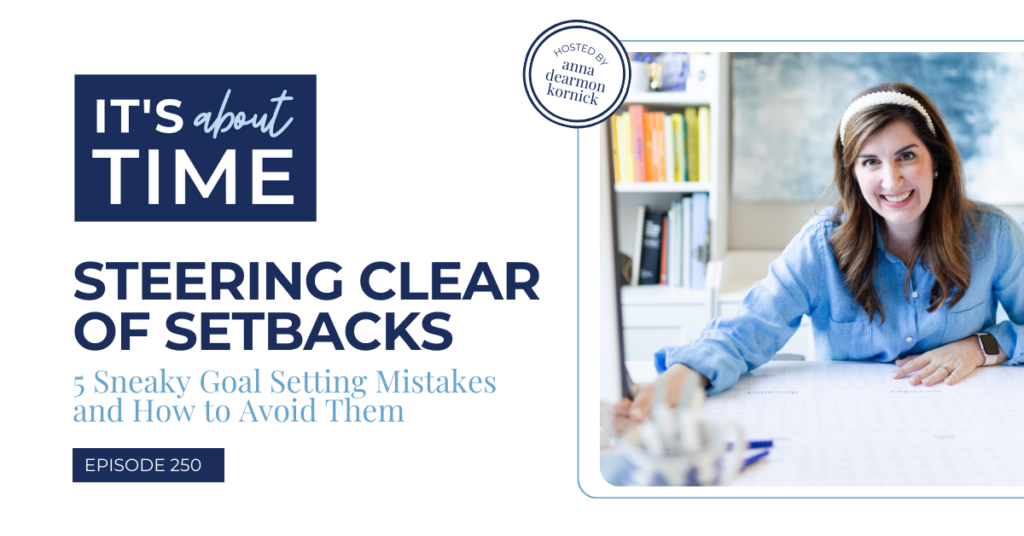How to set boundaries
LISTEN IN APPLE PODCASTS | LISTEN IN SPOTIFY | LISTEN IN STITCHER

Today’s episode is all about goal setting, and I get it — goal setting might be the last thing on your mind right now. But stay with me.
Goal setting is essential for good time management because it helps you focus your energy on what truly matters, guiding how you spend your time so you can make meaningful progress without feeling overwhelmed.
And speaking of overwhelm, we’re heading into the end of the year, and that usually means a whirlwind of activities, travel, holiday events, and looming work deadlines. It’s a season that can honestly feel more about surviving than thriving. But if you can carve out even a small window of time to think ahead, it can make all the difference for starting the new year on solid ground.
And that’s what today’s episode is all about. I’m revealing the five biggest and most common mistakes we make when setting goals. I’m not talking about the obvious stuff, but the sneaky pitfalls that even the most organized and motivated among us fall into—especially when we’re balancing careers, family, and our own dreams. And of course, I won’t leave you hanging! I’ll share practical tips and solutions to help you avoid these mistakes and set yourself up for success.
So today, we’re talking about:
- The most important step that most people overlook when setting goals—and why skipping it can cost you.
- The surprising reason why lacking a strong ‘why’ could be undermining your motivation.
- How your goals might be secretly sabotaging your progress
- What it looks like to go overboard with goal-setting and how to rein it in to avoid burnout
Goal Setting Mistake #1: Skipping the Reflection Phase of Goal-Setting
Alright, let’s jump into the first and perhaps most overlooked mistake: skipping the reflection phase. If you’re like most people, you might think, ‘ Reflect? Who has time to reflect?’ Our society puts so much emphasis on constant action—getting things done, moving forward, and ticking off boxes. But here’s the problem: when we’re always pushing ahead without pausing, we often set goals that don’t align with what we’ve actually learned or experienced.
What is the reflection phase of goal-setting?
So, what is the reflection phase, exactly? It’s a dedicated moment to stop and think through what’s happened over the past year. It’s about asking yourself what worked, what didn’t, what you’re proud of, and what lessons you’ve learned. Skipping this part means missing out on vital insights that could shape your next goals in a meaningful way.
I know that with work deadlines, kids’ schedules, and endless to-do lists, taking time to reflect can feel unrealistic. But the truth is, without this step, we’re often setting goals that don’t make sense for where we are now or what we’ve discovered about ourselves over the past year.
Here’s how you can make reflection manageable: set aside just 15 to 30 minutes.
In my annual goal-setting workshop, Ready, Set. GOALS, we ask four questions that are simple but powerful: ‘What went well?’ ‘What didn’t go well?’ ‘What am I celebrating?’ and ‘What lessons did I learn?’ Even taking a short moment to jot down answers to these can provide clarity that shifts how you approach your future goals.
If you’re not driving at the moment, I encourage you to grab a journal, your planner, or even just record some voice notes on your phone and reflect on these questions. You might discover that certain strategies really fueled your energy, while others left you feeling drained. This information helps you build goals that align with your values and set you up for success.
Looking back – reflection – isn’t just about seeing what went wrong; it’s also a moment to recognize your wins—no matter how small. By looking back, you’ll step into the new year with clearer intentions and a better understanding of what’s truly important.
Goal Setting Mistake #2: Lacking a Strong “Why”
Now, let’s talk about the second common mistake that can sabotage your goals: lacking a strong ‘why’. This is one of those sneaky pitfalls that can leave you feeling unmotivated just weeks after setting that shiny new goal. And it’s easy to see why—when a goal doesn’t have a deeper meaning behind it, it’s hard to stay committed when life gets busy or obstacles show up.
Think about it: How many times have you set a goal just because it sounded like something you should do? Maybe it was a popular resolution that everyone was buzzing about, or something you felt pressure to add to your list.
I mean, how many of us started 2024 determined to wake up at 5 a.m. every day, convinced it was the secret to productivity—only to hit the snooze button because your toddler had you up at 3 a.m., making that 5 a.m. wakeup feel nearly impossible? Or decided to read one book a week, forgetting that your current pace is more like a chapter a month between bedtime stories, work deadlines, and the occasional Netflix binge?
If you’ve read my book, Time Management Essentials, you might remember that I talk about the importance of defining your purpose, which is made up of your vision for the future and your core values. My editor Cheryl and I almost called it your ‘Why’ instead of Purpose, so if this sounds familiar, that’s why! Understanding your purpose is like building a foundation that your goals can stand on. It gives them context and depth, making them more meaningful and motivating.
A strong ‘why’ is like a compass. It points you back to your purpose when you’re tired, distracted, or feeling doubtful. It’s what keeps you grounded on days when it’s easier to put your goals on the back burner. For instance, setting a goal to exercise more because everyone says you should is fine, but it might not be enough to keep you moving on those busy mornings. But if your ‘why’ is to boost your energy so you can keep up with your kids or to improve your mental health, it becomes more powerful.

How to Find Your Why for Goal-Setting
So how do you find a strong ‘why’? Start by asking yourself, ‘Why does this goal matter to me?’ Then go deeper. If your first answer is, ‘To feel better,’ ask, ‘Why do I want to feel better?’ Continue this process until you reach a reason that truly resonates. You’ll know you’ve found it when it feels personal, meaningful, and gives you that little spark of determination.
Connecting your goals to your vision, values, and purpose turns them into more than just items on a to-do list. It makes them part of who you are and what you care about. And trust me, that can be a game-changer when you’re navigating the ups and downs of everyday life.
Goal Setting Mistake #3: Being Too Vague
Alright, let’s move on to the third common mistake: setting vague goals. This is a trap that many of us fall into, especially when we’re excited about making changes but don’t take the time to spell out exactly what we mean. I get it—writing down ‘get organized’ or ‘be more productive’ sounds motivating, but what do those goals really mean? When our goals are vague, they’re hard to measure and even harder to achieve.
Think about it. If your goal is to ‘get healthier,’ what does that actually look like in your daily life? Without defining it, one day it might mean going for a run, and the next day it could mean ordering a salad instead of fries. This lack of clarity makes it difficult to track progress, celebrate wins, or know when you’ve actually reached your goal.
It’s like setting a goal to ‘be more organized.’ That could mean anything from decluttering your entire house to just getting your kids’ school bags ready the night before. Or ‘be more productive’—a goal that sounds good but might lead to feeling guilty whenever you take a much-needed break. Vague goals set you up for frustration because they lack structure.
How to know if your goal is specific enough
So, how do you know if your goal is specific enough? Here’s a quick test: ask yourself if someone else could read your goal and understand exactly what you intend to do. If they can’t, or if they have to ask, ‘What do you mean by that?’—it’s a sign that your goal needs more detail.
The answer is to make your goals SMART—Specific, Measurable, Attainable, Relevant, and Time-bound. Instead of saying, ‘get organized,’ try saying, ‘organize my home office by decluttering for 15 minutes a day for the next two weeks.’ Instead of ‘be healthier,’ go with, ‘walk for 30 minutes after dinner three times a week.’ This kind of clarity turns a broad ambition into an actionable plan.
Every year at, Ready. Set. GOALS, we walk away with SMART goals fully fleshed out and ready for the new year. A clear roadmap to feel confident about where you’re headed.
When your goals are specific, you know exactly what you need to do and can celebrate each small win along the way. Plus, you’ll feel a sense of progress, which is key to staying motivated and on track.
Goal Setting Mistake #4: Being Overly Ambitious
Let’s move on to mistake number four: being overly ambitious.
Oh, this one hits home for so many of us, especially if you’re the type who dreams big, juggles a lot, and always feels like you should be doing just a little bit more. But here’s the hard truth: setting too many goals or goals that are too large can lead to overwhelm, burnout, and, ultimately, giving up on them altogether.
It’s easy to get caught up in the excitement of a fresh start. January rolls in, and suddenly you’re convinced that this is the year you tackle everything—career growth, fitness challenges, new hobbies, home makeovers, you name it. But here’s a sobering fact: most people give up on their New Year’s resolutions by January 17th. Why? Because trying to change too much at once often becomes unsustainable.
The case for setting Adventurous Goals
Now, don’t get me wrong—I’m a big advocate for setting SMART goals: Specific, Measurable, Attainable, Relevant, and Time-bound. They give your ambitions structure and clarity. But I also believe that some of your goals should be adventurous. Why? Because those are the goals that push you to new heights, that spark excitement and make life feel more fulfilling. However, if all of your goals are adventurous, it’s a recipe for burnout and disappointment. We just can’t give 110% in every single area of our lives, even if we desperately want to.
Picture this: you’ve set out to launch a side business, train for a marathon, declutter your entire home, and take up a new skill, like learning a language—all at once. By week two, you’re already stretched thin, and keeping up with day-to-day responsibilities starts to feel impossible. That initial motivation turns into frustration, and suddenly, those ambitious goals start slipping through the cracks.
Balance your Adventurous Goals with Attainable Goals
So, how can you avoid being overly ambitious while still honoring your drive and adventurous spirit? The key is balance. Choose one or two adventurous goals that ignite your passion, then balance them with SMART, achievable goals that keep you grounded. For example, if your big, adventurous goal is to run a half marathon, pair it with a smaller, specific goal like ‘run three times a week for 30 minutes.’ This way, you’re reaching for new heights but also pacing yourself for success.
Remember, progress is still progress, no matter how slow. When you focus on a mix of adventurous and SMART goals and break them down into achievable steps, you’re more likely to stay consistent, avoid burnout, and celebrate those wins along the way. It’s not about doing everything; it’s about doing what matters in a way that fits into your life.
Goal Setting Mistake #5: Comparing Your Goals to Others’
Alright, friends, we’ve made it to the fifth and final common mistake: comparing your goals to others’. If you’ve ever looked around and thought, ‘Why don’t I have goals like that?’—whether it’s scrolling through social media, chatting with friends, or overhearing coworkers talk about their big plans—you’re not alone. It’s so easy to fall into the trap of thinking your goals need to match what everyone else is doing. And let’s not forget the expectations from our parents or the unspoken competition with the other moms from school.
Comparison is natural, but it can be especially damaging when it comes to setting and pursuing goals. Here’s the thing: what we see of other people’s lives is often like an iceberg. We only see the tip—the polished, impressive parts. What we don’t see are the challenges, sacrifices, and struggles below the surface. When we compare our full, messy reality to someone else’s highlight reel or perceived successes, our goals can suddenly feel small or insignificant.
Setting goals based on what we think we should do or what others expect can lead to frustration and a disconnect from our own values. This often results in pursuing goals that don’t truly resonate, making it easy to lose motivation and joy along the way.
How to stop the comparison game in goal setting
So how do you stop the comparison game? Start by recognizing that everyone’s path is different. What works for someone else might not work for you, and that’s not just okay—it’s good. Your goals should align with your unique values, needs, and life circumstances. Reflect on what success looks like for you. Is it creating more time for family, pursuing a creative project, or achieving work-life balance? Own it.
And remember, comparison doesn’t just come from social media. It can come from people we interact with every day—friends, colleagues, even family members who may have expectations of us. When these comparisons creep in, remind yourself that you’re only seeing part of their story. The iceberg metaphor is helpful here: while we might see someone thriving above the surface, we have no idea what challenges or compromises they’re facing below the waterline.
I know firsthand how challenging it can be to avoid the comparison game, and that’s why this Thursday, I’m releasing a special bonus episode called “5 Simple Ways to Stop the Comparison Game and Stay True to Your Own Goals.” I’ll be sharing practical strategies and a bit about how I’ve navigated comparison in my own life. If you haven’t hit the follow button in your fave podcast app to subscribe to the show, be sure to do that now so you don’t miss Thursday’s bonus episode.
Resources Mentioned:
- FREEBIE: 250 Inspired Goal Ideas for 2025
- Grab your 2025 Big Picture Year Calendar
- Ready, Set. GOALS: a 3-day live goal setting workshop to have your most exciting, intentional year yet
- Time Management Essentials: The Tools You Need to Maximize Your Attention, Energy and Productivity
Related Episodes:

Be the first to comment